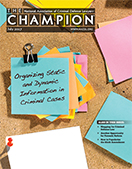July 2017

Learn about the tools that can help attorneys take in and organize large amounts of information.
Articles in this Issue
-
Affiliate News
Affiliate News, July 2017 Champion.
-
Another Opportunity for Forensic Reform: A Call to the Courts
When a case includes forensic evidence, one issue for the court is whether the testimony that will be presented is scientifically valid or generally accepted as scientifically valid. The report by the President’s Council of Advisors on Science and Technology (PCAST) is an important resource for defense attorneys and for the criminal justice system at large. It examines the foundational validity of some of the most commonly used pattern matching disciplines. The PCAST report provides strong support for courts to consider the exclusion of bitemark, hair, footwear identification, and firearms comparison testimony. However, in the event a court is not willing to preclude an examiner from testifying, it is incumbent on the defense to insist the examiner’s testimony be limited to what has been scientifically established.
-
Blogging for Criminal Defense Law
The idea of blogging as a way for people to promote themselves online and to showcase their knowledge of the law is nothing new. Many attorneys use a blog either as a standalone item or as part of their practice’s web presence. Writing a blog has benefits, but it also comes with some negatives. One should be aware of both before embarking on such a project.
-
Book Review: American Spies - Modern Surveillance, Why You Should Care, and What to Do About It
The story of U.S. surveillance — its promises and its pitfalls — is challenging to communicate in 300 pages. That the amount of publicly available information surrounding these measures is so severely limited makes the articulation of surveillance’s “Golden Age” an even more arduous task. Any book addressing modern surveillance faces these hurdles, yet Jennifer Stisa Granick, Director of Civil Liberties at Stanford Law School’s Center for Internet and Society, manages to provide an expansive, nuanced, and engaging assessment of the complex surveillance state under which people in America live. American Spies is accessible to a wide audience, acting as an introduction to modern surveillance or a review for experienced lawyers. Indeed, the layperson who does not have extensive knowledge regarding surveillance law can engage in a worthwhile manner, as long as one manages the necessarily expansive use of acronyms in the text.
-
Book Review: Evidence Matters - Science, Proof, and Truth in the Law
Susan Haack (pronounced “hawk”) is a world-renowned philosopher whose original work in epistemology (theory of knowledge) has earned international acclaim. Haack is regarded among the top philosophers today, and possibly, the most important woman ever in that field. She is currently Professor of Philosophy and Law at the University of Miami School of Law in Coral Gables, Florida.
-
From the President: Turner v. United States
The story of Turner v. United States (Sup. Ct. 2017) should be told not just to bemoan the result, but also to highlight the role criminal defense lawyers play, the clients they represent, and the reasons defense lawyers do what they do.
-
Getting Scholarship Into Court Project
Getting Scholarship Into Court Project, July 2017 Champion.
-
Informal Opinion: Weaver v. Massachusetts: A Violation of the Public-Trial Right Does Not Necessaril
In denying the ineffective assistance of counsel claim in Weaver v. Massachusetts, the U.S. Supreme Court made it harder for defendants to gain relief from convictions that resulted from structurally flawed trials.
-
Organizing Information and Taking Notes for Criminal Cases
Attorneys need to establish methods for organizing information and taking notes. Relying on techniques used in college is probably not a good idea. Comparison tables, concept maps, and grid/table systems can help counsel take in and organize large amounts of data, often from sources that may be inaccurate. Lisa Steele discusses tools that will help attorneys analyze discovery and verbal information.
-
Public Defense: Popularizing the Sixth Amendment
In the eyes of the public, not all constitutional protections are equal. Some have flashy reputations, while others are wallflowers — until someone needs to depend on them. The First Amendment is glamorous, sometimes involving brave reporters who go to jail for their principles. The Second Amendment inspires macho action movies and defiant vows involving cold, dead hands. Americans have trouble, however, championing the Sixth Amendment right to counsel. That’s a shame, because it is among the most powerful rights granted by the U.S. Constitution. Jeff Adachi says public defenders must embark on a campaign to give the Sixth Amendment its due. He suggests several ways to get the word out, including an effort to bring stories featuring public defenders back to television screens and the creation of public service announcements and social media campaigns to educate people on their inalienable right to counsel.
